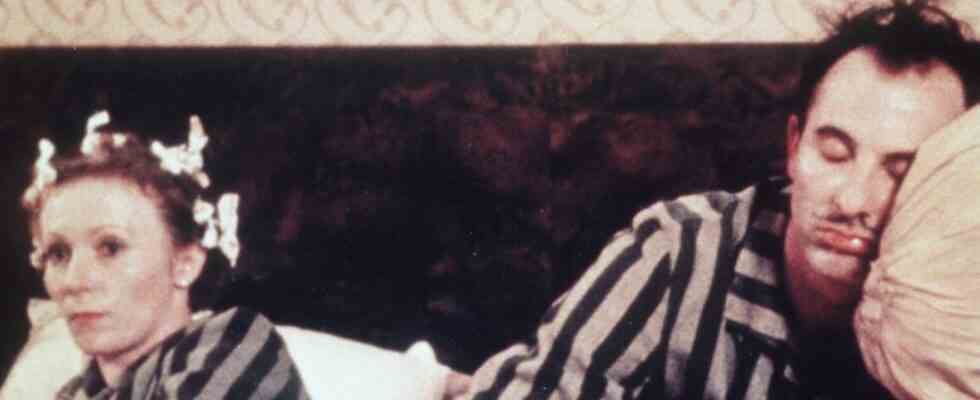“The Eisnerin must not die!” When Werner Herzog found out in 1974 that the grande dame of film criticism was dying in Paris, he made a defiant decision: if he could walk to Lotte Eisner, she would survive. He marches off from Munich and stops in Pasing for the first time. Herbert Achternbusch, who played a peasant boy in Herzog’s film “Everyone for himself and God against all”, is in the hospital there.
“Achternbusch had jumped out of the moving VW bus,” Herzog will later report in his travel diary “From Walking in the Ice” and continue: “That didn’t bother him. Then he jumped again and broke his leg. Now he’s lying down on Ward 5.” The anecdote tells an overwhelming amount about the universal artist Achternbusch, who died earlier this year at the age of 83 in his native city of Munich. It tells of the filmmaker, painter, author, actor and unwavering free spirit who didn’t shy away from any risk. By the defiant Hallodri, who took on the elements himself. From the jumper without a net and double bottom, always on the go or at least dancing. As in the most beautiful moments of his anarcho comedy “Bierkampf” shot in the 1970s. In it he lets himself drift lightly through a steaming Oktoberfest tent. Pure slapstick and homage to the beginnings of cinema. In a 2017 interview with the SZ, he recalled: “I was nowhere as real as in the beer fight. I go through the beer tent disguised as a policeman and tease people until one even hits my upper jaw and I fly through the air, feet up. That was phenomenal.”
There is also such a Luftikus moment in Achternbusch’s “Die Olympiasiegerin”, as we shall see. The book, published in 1982, and the film that came out of it a year later, are perhaps the most personal work in his very own private universe, in which the boundaries between biography and art are always blurred. Achternbusch was born in 1938 as an illegitimate child and grew up with his grandmother in the Bavarian Forest. His mother, the sports teacher Luise Schild, killed herself. In 1960 he was adopted by his biological father.
The content of the “Olympic champion”? To put it mildly, it’s a bit difficult to grasp, but that’s kind of irrelevant. Times and places, reality and fiction are mixed up wildly: His year of birth 1938, war, post-war period. Munich, Plattling-West, -North, -East, -South. Police officers and demonstrators, angels and death, deception and disappointment and at the end “The “Exit”. That’s the name of the final chapter.
“The trouser door is hanging out of your face”
“Herbert” dreams of a new procreation. Art makes it possible. This time, in his thirties, he wants to choose his parents himself and decides on Adi and Ilona. Adi is a dentist, but above all a stray and Stritzi, who hangs out on the trotting track and in the inn. He wants to be called John Dillinger, like the legendary gangster. It goes without saying that this Adi doesn’t take his loyalty to his wife Gabi too seriously and follows Ilona to the Dantebad to invite her for coffee and cake. After all, Ilona is “the most beautiful woman in all of Munich”. She also wants to be Olympic champion in Tokyo in 1940.
Preface and first chapter of this tender, heated, evil creation myth against one’s own biography throw at the possibly overwhelmed reader a few fragments of understanding that he should heed. “If you don’t think much of the form,” it says, “you don’t know anything”. Just like the stupid Bavarians, which is exactly why they don’t understand his films. Because they are “winding films” that refuse to have a plot and “do not fit into their straightened, sanitized brains”.
What applies to the films also applies to the books. The chapters of the “Olympic Champion” resemble multiple exposure photographs. Dialogues alternate with monologues, surreal dream sequences with concrete script instructions. If you are willing to just meander along, Achternbusch will take you to the TSV 1860 and the Deutsches Museum, to the Wittelsbacher fountain and to the Feldherrnhalle and will delight you with disarming sentences such as “The trouser door is hanging out of your face”.
Finally, at the Königsplatz, there is jumping again. Adi asks his Ilona: “For every stone (…) that you don’t touch, you get a hundred. And she jumps over the Königsplatz.” In the film you can see Annamirl Bierbichler and Herbert Achternbusch as Ilona and Adi, completely detached, running, flying, running, flying. Until exhaustion. Maybe Achternbusch’s constant emphasis on the physique has something to do with the fact that you’re no longer cold like that. Because that’s what “The Olympic Champion” is all about. About warming up inside and the color red: “It was a relief when my father adopted me and I got his name, which I bear today. Then we went to the carnival, he in a red wool dress. We danced. In the morning I went to the Train station. Declaring war on the rubbish in the head, the sun rose red over Munich.”
Herbert Achternbusch, The Olympic Champion. Süddeutsche Zeitung Library, Munich 2008. 138 pages. 9.90 euros/antiquarian

